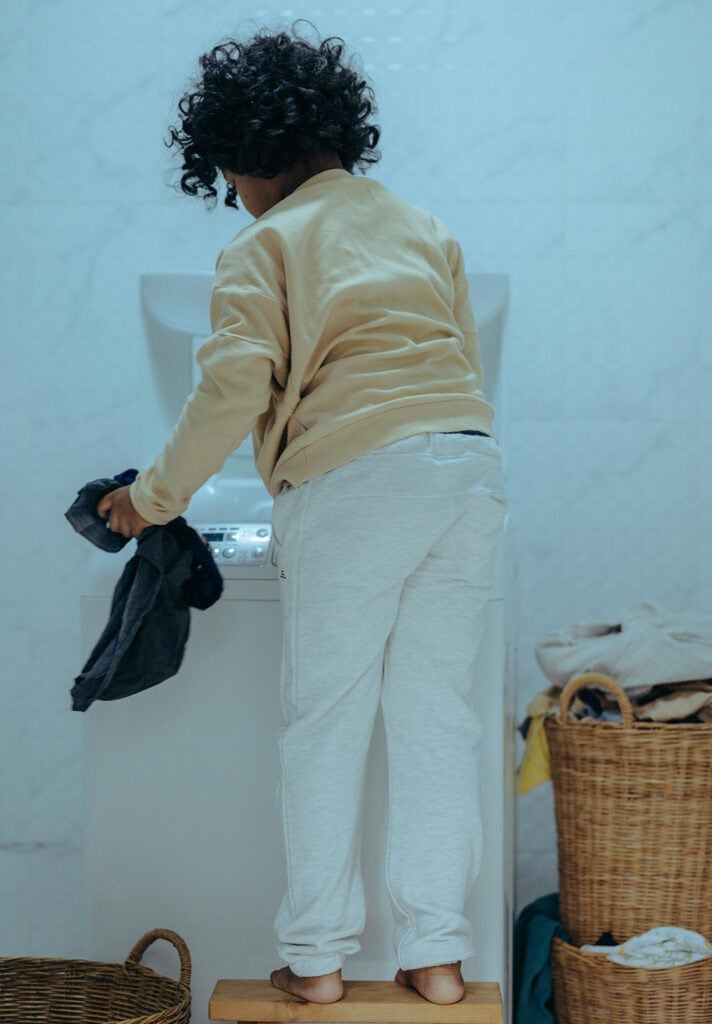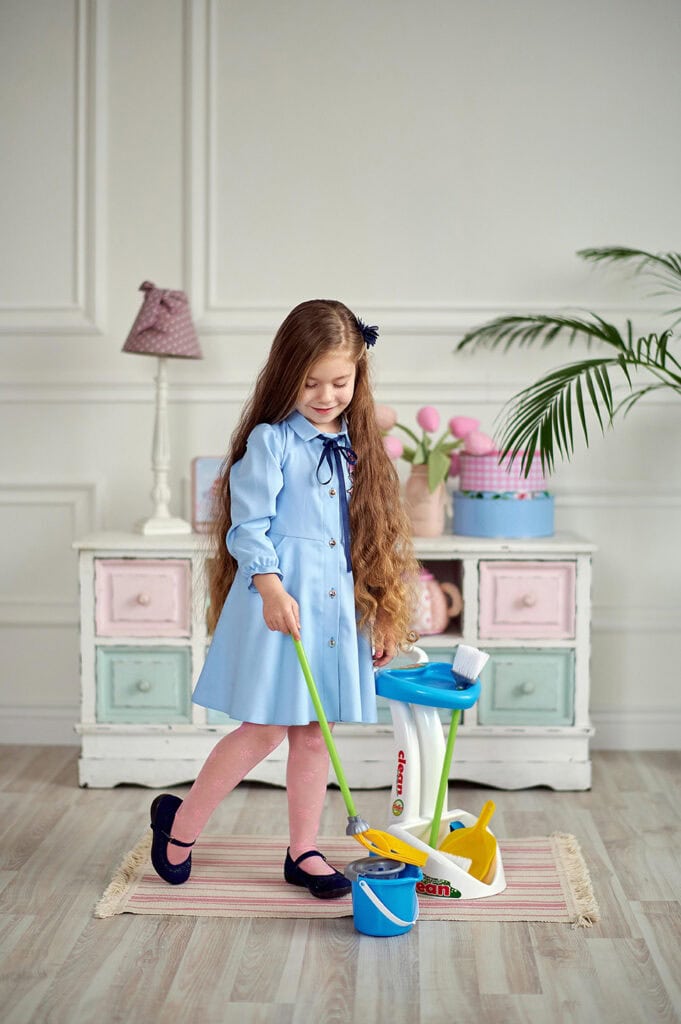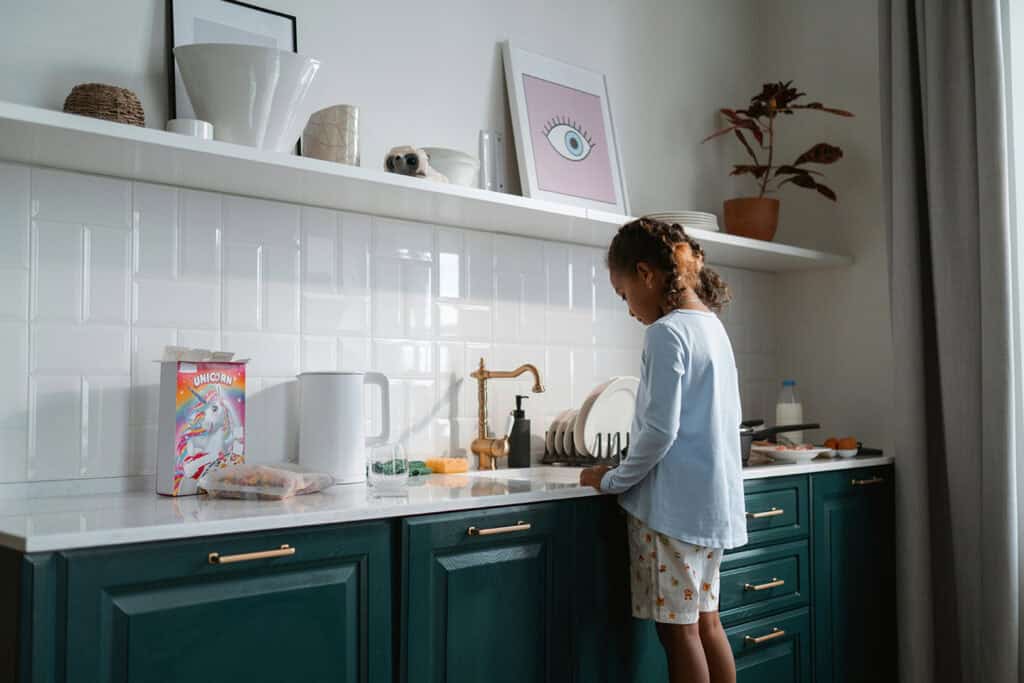

Are you struggling to find ways to teach your preteens responsibility? Involving 9-12-year-olds in chores around the house is a practical and effective solution. Assigning age-appropriate chores for kids not only fosters a sense of accomplishment but also equips them with essential life skills.
These chores teach responsibility, as kids learn accountability through tasks like loading the dishwasher and managing their laundry.
They also promote teamwork by engaging older kids to assist their younger siblings. Additionally, kids build independence by preparing their own lunch box and helping with groceries, developing self-reliance in the process.
By incorporating these activities into their routine, parents can pave the way for responsible, capable adults who contribute positively to family life.
Ready to explore how you can make chores fun and educational?
Here are some age-appropriate chores for 9-12-year-olds, along with brief explanations for each:
- Making Their Bed: Teaches responsibility and the importance of a tidy space.
- Cleaning Their Room: Encourages organization and personal responsibility.
- Washing Dishes: Helps develop teamwork and kitchen skills.
- Sorting Laundry: Teaches organization and prepares them for doing their own laundry.
- Vacuuming: Provides practical cleaning skills while helping keep the house tidy.
- Taking Out the Trash: Instills a sense of duty and helps maintain a clean environment.
- Preparing Simple Meals: Encourages independence and basic cooking skills.
- Walking the Family Dog: Teaches care for pets and promotes physical activity.
- Dusting Surfaces: Introduces them to cleaning and maintaining household cleanliness.
- Helping with Grocery Shopping: Teaches budgeting and making healthy choices while involving them in family activities.
See also Stay at Home Mom Responsibilities: 8 Duties and Essential Tips
Benefits of Assigning Chores to Preteens

Assigning chores to preteens is essential for teaching responsibilities and life skills. Age-appropriate chores for kids ages 9-12, often more complex than those for younger children, help them develop independence and wellness.
These tasks can include preparing their own lunch, handling household chores like vacuuming, and managing a chore chart. By involving kids in household tasks, parents can have a sense of responsibility and accountability.
This approach also prepares them for chores for teenagers, enabling them to handle more complex tasks independently.
Assigning chores for kids not only supports family life but also contributes to the development of vital life skills. Encouraging preteens to assist younger siblings also promotes teamwork and empathy.
Here are 10 benefits of assigning chores to preteens:
- Prepares for Adolescence: Eases transition to teenage responsibilities.
- Develops Responsibility: Teaches accountability for tasks.
- Promotes Independence: Boosts confidence and self-reliance.
- Teaches Life Skills: Prepares them with essential skills like cooking and cleaning.
- Enhances Time Management: Helps them balance chores with other activities.
- Encourages Teamwork: Fosters collaboration with family members.
- Builds Work Ethic: Instills discipline and a strong work ethic.
- Improves Self-Esteem: Boosts confidence through task completion.
- Supports Family Bonding: Strengthens family cooperation and bonding.
- Teaches Financial Literacy: Helps understand money and saving through paid chores.
Chore Ideas for 9-12 Year Olds

Chore ideas for 9-12-year-olds include setting a daily, monthly, and weekly chores list to manage tasks around the house. This age group can handle responsibilities like making their beds, taking out the trash, and washing dishes.
Teaching kids the difference between chores vs responsibilities helps them understand their role in maintaining the household.
Here are 30 ideas in 3 categories:
1. 10 Daily Chores for 9-12 Year Olds
- Water Plants: Take care of household plants.
- Make Their Bed: Start the day with a clean and organized room.
- Set and Clear the Table: Assist with meal preparation and clean-up.
- Load and Unload the Dishwasher: Maintain kitchen hygiene.
- Feed Pets: Ensure pets are fed and cared for.
- Put Away Toys and Books: Keep personal spaces tidy.
- Take Out the Trash: Remove household waste daily.
- Help with Meal Prep: Assist in preparing meals and snacks.
- Wipe Kitchen Counters: Keep surfaces clean and sanitary.
- Sweep the Floor: Maintain cleanliness in common areas.
2. 10 Weekly Chores for 9-12 Year Olds
- Vacuum the House: Keep carpets and floors clean.
- Dust Furniture: Maintain a dust-free living environment.
- Clean Their Room: Deep clean and organize personal space.
- Wash and Fold Laundry: Assist with the family’s laundry needs.
- Clean the Bathroom: Help maintain bathroom hygiene.
- Take Recycling Out: Manage recyclable materials.
- Mow the Lawn: Help with outdoor yard work.
- Clean Windows: Ensure windows are clean and clear.
- Help with Grocery Shopping: Assist in selecting and carrying groceries.
- Organize the Pantry: Keep food storage areas tidy.
3. 10 Monthly Chores for 9-12 Year Olds
- Wash the Family Car: Clean and maintain the vehicle.
- Clean Out the Garage: Organize and declutter the garage.
- Deep Clean the Refrigerator: Remove old food and sanitize shelves.
- Organize Closets: Tidy up and sort through clothes and items.
- Assist with Seasonal Yard Work: Help with gardening or raking leaves.
- Wipe Down Walls and Baseboards: Keep walls and baseboards clean.
- Clean Light Fixtures: Dust and wipe down light fixtures.
- Check Expiry Dates in Pantry: Ensure food items are up to date.
- Help with Home Maintenance: Assist in minor repairs or cleaning.
- Sort and Donate Unused Items: Encourage giving and decluttering.
See also Goal Setting Books: 14 Must Read Books to Empower Your Goal Setting
Teaching Responsibility Through Household Tasks

Teaching responsibility through household tasks is essential for children’s development. Assigning specific chores, such as managing their bedroom, preparing lunch, or walking the dog, helps them learn to balance responsibilities with school and friends.
Tasks like organizing the hamper or cleaning the bathroom instill a sense of achievement and contribution. Assisting younger siblings or taking on a set number of weekly chores helps with time management skills.
These activities not only keep them busy but also prepare them for future life planning, ensuring they grow up to be responsible, capable adults who can manage their personal and professional lives effectively.
Here are 10 Techniques for Teaching Responsibility Through Household Tasks:
- Discuss the Importance: Explain how each chore contributes to the household and the benefits of being responsible.
- Start Early: Introduce simple chores to young children to build a foundation of responsibility.
- Set Clear Expectations: Clearly define each task and what is expected to ensure understanding.
- Create a Chore Chart: Use a visual chart to track daily, weekly, and monthly tasks.
- Assign Age-Appropriate Chores: Match chores to the child’s age and capabilities to ensure they can complete tasks successfully.
- Lead by Example: Demonstrate how to complete tasks correctly and responsibly.
- Provide Positive Reinforcement: Praise and reward children for completing tasks to encourage continued effort.
- Teach Time Management: Help children plan and schedule their chores around school and other activities.
- Encourage Teamwork: Involve the whole family in household chores to foster a sense of teamwork.
- Rotate Chores: Regularly change chores to keep children engaged and teach them various skills.
Making Chores Fun and Engaging

Making chores fun and engaging can help kids learn responsibility while contributing around the house. Parenting experts suggest using life planning tools like chore charts and reward systems to motivate children.
Tailor chores for kids to their age and abilities, turning tasks like sorting dirty clothes into games. Rotate age-appropriate chores to keep things interesting and teach various skills.
Celebrate their achievements and provide positive feedback. By incorporating fun elements, children not only enjoy their tasks but also develop a sense of responsibility, learning how many chores they can manage and the importance of contributing to the household.
Here are 10 Tips for Making Chores Fun and Engaging:
- Set a Timer: Create excitement with timed chores.
- Use Chore Charts: Track progress with colorful charts.
- Turn Chores into Games: Make chores fun with games or timed challenges.
- Offer Rewards: Give points or small prizes for completing chores.
- Play Music: Use music to make chore time enjoyable.
- Rotate Chores: Change up chores regularly to keep things interesting.
- Work Together: Do chores as a family to foster teamwork.
- Provide Choices: Let kids pick their chores for a sense of control.
- Celebrate Achievements: Praise or reward completed chores.
- Incorporate Learning: Make chores educational with counting or cleanliness lessons.
Safety Tips for Preteens Doing Chores

Safety is crucial when preteens help with chores. Ensuring they understand the importance of family bonding while staying safe, promotes a secure environment. Teaching proper techniques and providing supervision helps prevent accidents, ensuring chores are a positive, safe, and educational experience for everyone involved.
Here are 5 tips:
- Supervise Initial Attempts: Guide preteens through tasks until they are confident.
- Dress Appropriately: Ensure they wear suitable clothing and protective gear when needed.
- Teach Proper Techniques: Show them the correct way to handle chores to avoid injuries.
- Set Clear Boundaries: Explain which tasks require adult supervision.
- Create a Safe Environment: Keep hazardous items out of reach and ensure a tidy workspace.
See also Career or Relationship: 6 Steps for Finding a Right Balance
Chores for 9-12 Year-Olds: A Recap
In conclusion, involving 9-12-year-olds in household chores offers numerous benefits for both kids and families. Assigning age-appropriate tasks, such as vacuuming, preparing lunch boxes, or feeding family pets, not only teaches responsibility but also helps a sense of accomplishment.
These chores for kids provide a valuable opportunity for family bonding activities, as older siblings can guide younger siblings, creating teamwork and cooperation within the household. Additionally, children learn essential life skills while helping around the house, such as laundry and dinner preparation.
Offering pocket money as an incentive can motivate middle schoolers to participate actively in household responsibilities. By starting to plan and implement these tasks, families can create a balanced environment that encourages a personal growth checklist and contributes to a well-organized home.
Ultimately, assigning chores at this age helps children develop into responsible adults while strengthening family connections.


